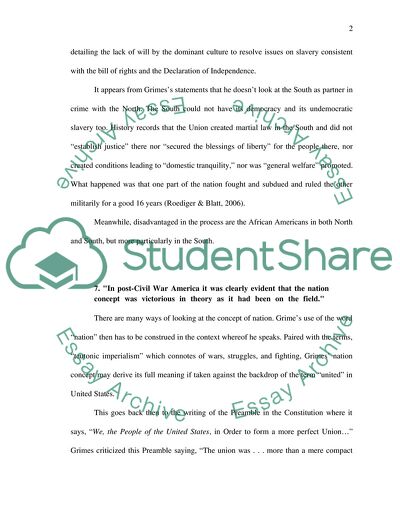
- Home
- Free Samples
- Premium Essays
- Editing Services
- Extra Tools
- Essay Writing Help
- About Us
- Studentshare
- Subjects
- Miscellaneous
- American political theory
American political theory - Essay Example

- Subject: Miscellaneous
- Type: Essay
- Level: Undergraduate
- Pages: 4 (1000 words)
- Downloads: 0
- Author: vicenta06
Extract of sample "American political theory"
Americans tend to think of slavery as sort of regional deviance. In the North, for example, the meaning of slavery is different (Roediger & Blatt, 1993). The people were more accepting of the slaves and of their conditions. But the presence of the so-called free states of the North holds the North -- by public understanding -- accountable as partners in cahoots with the South regarding the horrors of slavery. The attitudes of both the South and the North, in fact, demonstrate that the notion of African racial inferiority was and is a function of national consensus of the dominant European culture (Roediger, & Blatt, 1993).
Although various groups have expressed outrage against this prejudice, the racial views of white America have not changed. Indeed, history is replete with accounts detailing the lack of will by the dominant culture to resolve issues on slavery consistent with the bill of rights and the Declaration of Independence. It appears from Grimes’s statements that he doesn’t look at the South as partner in crime with the North. The South could not have its democracy and its undemocratic slavery too.
History records that the Union created martial law in the South and did not “establish justice” there nor “secured the blessings of liberty” for the people there, nor created conditions leading to “domestic tranquility,” nor was “general welfare” promoted. What happened was that one part of the nation fought and subdued and ruled the other militarily for a good 16 years (Roediger & Blatt, 2006). There are many ways of looking at the concept of nation. Grime’s use of the word “nation” then has to be construed in the context whereof he speaks.
Paired with the terms, “teutonic imperialism” which connotes of wars, struggles, and fighting, Grimes’ nation concept may derive its full meaning if taken against the backdrop of the
...Download file to see next pages Read MoreCHECK THESE SAMPLES OF American political theory
Critique on George W. Carey's: A Student's Guide to American Political Thought
Interest Groups and Their Role in American Politics
Soci-Cultural Issues in Education
Frymer's Theory of American Politics: Electoral Capture
Presidential Candidate - Wesley Clark
Biography of Alan Stillman
African American History
America: War and Diplomacy

- TERMS & CONDITIONS
- PRIVACY POLICY
- COOKIES POLICY